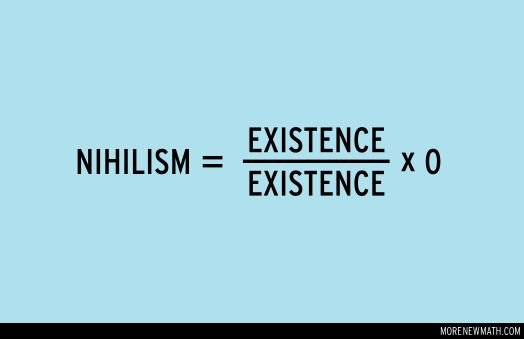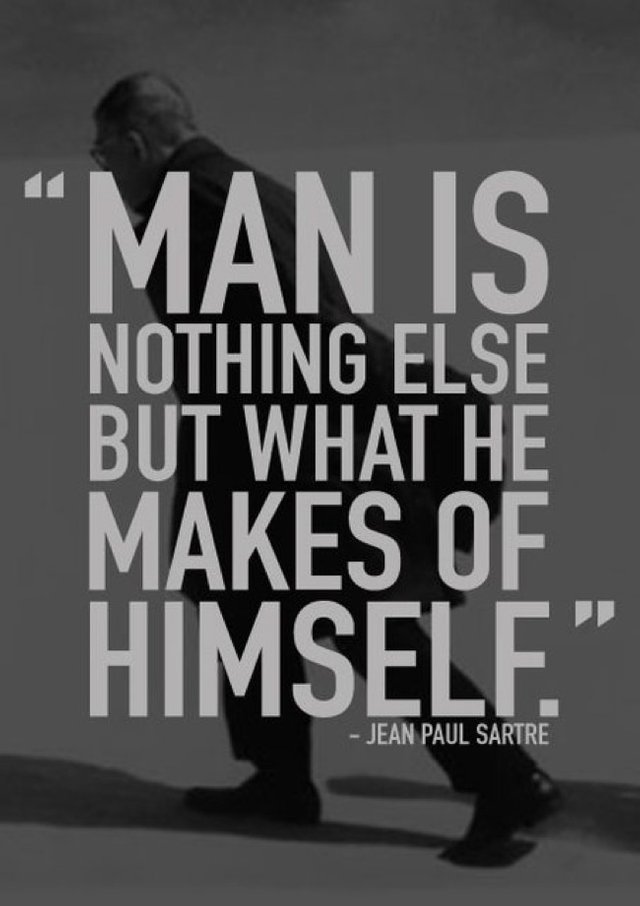Existentialism and Nihilism - Why I, myself, am an existentialist.
Before I get into these two concepts, I feel the need to write a bit about philosophy first.
Philosophy
Philosophy
noun.
the study of the fundamental nature of knowledge, reality, and existence: an attitude that acts as a guide for behaviour.
The term "philosophy" is said to have been coined by Pythagoras of Samos. Philosophy concerns existences, reality and it's meaning as is evident from the definition above. Philosophers struggle to find the answers to the questions that you and I wonder from time to time, whether we are enjoying the ups of life or dreading it's downs. What is the meaning of life? What is the purpose of our existence? Why and how did we come to exist? Is anything real? Is it possible to know everything? If there is an almighty god who loves everyone, why is there undeserved suffering? These are just a few of the questions philosophers try to answer.
In Plato's Allegory of the Cave, Socrates describes a cave inhabited by people who are chained to a wall facing a blank wall. When things pass in front of a fire behind the people, shadows are projected on the blank wall. These people give names to these shadows. To them, that wall is all the reality they have ever known or will know. Plato supposes that a prisoner from the cave is freed. The prisoner realizes that the shadows on the wall are nothing as compared to the true reality and world outside of the cave. When he turns and faces the fire, only a bit of reality is revealed to him yet his eyes would still hurt. Suppose that the same prisoner is dragged out of the cave into the Sun. Although, this would greatly enhance the pain, the prisoner would know that there is a much greater universe outside of the cave everyone else he knows inhabits. He then would want to get everyone out of the cave, into the Sun for he knows that a man living in that cave has not a true perception of reality. Here, that freed prisoner is just like a philosopher to whom the actual reality has been revealed.
I have crossed the seas, I have left cities behind me, and I have followed the source of rivers towards their source or plunged into forests, always making for other cities. I have had women, I have fought with men; and I could never turn back any more than a record can spin in reverse. And all that was leading me where? To this very moment...

Everyone tries to develop their own meaning and definition of life. For some, the meaning of life is to live it the way God has taught us. For some, it is to help others. And for some, life is entirely meaningless. You and I may have vastly differing meanings and definitions of life, but that doesn't AND shouldn't make us enemies, like many of the people in today's world think. I'm talking about the "you do not agree with me therefore, you are wrong and I am right" mentality. Your meaning of life might be to help others while for me, life could be meaningless. Every individual has sort of his own "sub-philosophy". He may be a nihilist or an existentialist but that doesn't mean that his views HAVE to be limited to the views of that specific group. He could develop other views of his own that do no contradict the views of the specific group he belongs which keeps him from not being a(n) nihilist/existentialist.
Cogito ergo sum
I think, therefore I am.
One of the branches of Philosophy is metaphysics.
Metaphysics
noun.
The branch of philosophy that deals with the study of being and existence is called metaphysics.
Understanding the basic concept of metaphysics is necessary to fully understand what is nihilism/existentialism.
Nihilism

From the latin word Nihil meaning Nothing. According to Nihilism, nothing has any meaning. Everything is meaningless... Yeah. Everything has no purpose/meaning except the purpose/meaning we "assign" to it. Take a ladder, for example. For a nihilist, that ladder has no meaning, except for us to climb up on it and change light-bulbs, clean things and whatnot. One of the main goals of philosophy is to find the meaning of different things in the universe. It is to find the meaning of universe itself. This is where Nihilism and Philosophy clash. Philosophy says that "everything" has a "meaning" while Nihilism says that "everything" has no "meaning." So, nihilism results in some "pretty" ideas like your life is absolutely meaningless on a grander scale, God does not exist, and you know nothing. In the nihilistic philosophy, it is simply impossible to acquire knowledge because it simple does not exist. Knowledge does not exist. What you consider to be knowledge are just assertions that cannot be proven, assertions that are just based on observations.
Nihilism denies not only the moral and religious principles, it denies philosophy. Nihilism says that nothing exists outside of our own minds, therefore nothing, in it's essence, is true.
Nihilism is the belief that nothing in the universe really, truly exists. It only exists in the mind of an individual. Therefore, it's impossible to prove that anything exists in reality because everything that an individual perceives as being real is just real in the mind of that specific individual and hence improvable. I don't think that a "true" nihilist exists in the world because a "true" nihilist should have an ever-present awareness that everything he knows, has known, will know, learns, has learned, and will learn does not exist beyond his own mind and perception. Thus, for him nothing exists and nothing has value.
Existentialism

Existentialism
noun.
A philosophical belief that one determines his own existence through acts of his own will as a free and responsible individual.
Existentialism is the most prevalent in the works of late 19th and 20th century European philosophers like Nietzsche, Camus and Kierkegaard. According to existentialism, philosophical thinking does not only start from a subject capable of thinking but it starts from a living, human subject. According to Kierkegaard, an individual is himself responsible for living his own life "authentically" and giving it meaning himself. That means, the meaning of one's life is whatever one assigns it to be. Take Joker, for example. He gives his life the meaning to destroy Gotham and also destroy Batman in doing so. He lives by this belief and almost every other thing that he does is in the pursuit of this goal. Similarly, Batman has assigned a meaning to his life that he wants to save Gotham from the evil that inhabits it and therefore he wants to keep Joker and the other baddies out of the city. He also lives by this belief and almost whatever he does is in the pursuit of this goal. This means that different individuals can assign different meanings to their lives, free from external pressure, even if these meanings of the lives of two different persons contradict each other. It's the third law at work in the above example.
According to existentialism, life has no pre-determined meaning. Whereas, nihilism says that there is no meaning to life, predetermined or otherwise. Period. This may be applied to objects too. Think back to that ladder, for a second. In existentialism, that ladder is a ladder because we use it to change bulbs, clean windows, and do other stuff. It had no pre-determined meaning, it has only the meaning we've assigned to it. While in nihilism, the ladder doesn't even exist.

One of the essential parts of existentialism is authenticity. You could say that authenticity is kind of a goal of existentialism. Authenticity could be defined as staying true to one's own self. Fundamentally, when you say that someone is "authentic" in this context, what you basically mean is that that specific individual stays true to his personality and character whenever, wherever he is. He does not do anything that goes against his personality and character. He is himself and he does those things which he himself would do. He is aware that whatever he is doing is in check with what he does and would do.
Absurdism is also something that interests existentialists. Absurdism is the conflict between the human tendency to seek the meaning of the universe and the human inability to find any. Even though, nihilists and existentialists both believe that the universe has no inherent meaning yet they differ on one thing. Existentialists believe that even without having an inherent meaning, universe can still be understood. Nihilists, needless to say, do not concur. According to them, the human race and species are insignificant relative to the universe and they cannot understand the universe and it's meaning because it just doesn't exist.
Why I am an Existentialist

Nihilism and existentialism are the philosophies that have held my interest for the longest time. I have always found something that has kept me from falling on the other side of the fence. I did some extensive reading to come to a conclusion once and for all. And I fell on the existential side of the yard.
After studying Nietzsche's Beyond Good and Evil, The Gay Science, Thus Spoke Zarathustra and Albert Camus' The Myth Of Sisyphus, I realized that I was compelled the most towards existentialism. After reading The Myth Of Sisyphus, I felt a pressing urge to ask myself, "should I continue to be? or cease to be?" Not in a suicidal kind of way, but in a "is there a purpose, meaning to all the things that I do everyday? If there isn't, why am I alive?" sort of way. The fundamental idea of existentialism is whether there is an afterlife or a God or not, I shall never have the opportunity to live here as me in this very moment every again. The world is filled to the brim with evil, but that doesn't mean that the opposite of evil doesn't exist. And sometimes there are moments when that very opposite of evil shines in the spotlight. That, I think, is the one of the most perfect philosophies for me to adopt and live by.
I am not particularly attracted to nihilism mainly because of it's high pessimistic sense. In existentialism, life has no predetermined meaning, which means you yourself give your life meaning. You are the master of your own life and destiny. I highly recommend reading The Myth Of Sisyphus and the works of Plato, Aristotle, Albert Camus, and Friedrich Nietzsche if you're interested in these things. I myself ended up taking the path of existentialism because there was a sense of hope in it. I don't know how to best describe it, perhaps "hope" is not the best word for it. But you'll know what kind of feeling that is when you finally figure out which philosophical belief you want to adopt and apply to your life.
Hello infinitor, we would like to inform you that you have been chosen as a featured author by the @robinhoodwhale initiave. We are currently in alpha testing, if you would like more info join robinhood chat on steemit.chat or pm @repholder.
Nice Work - Keep on Steeming!
The two things I've been thinking about a lot lately. I'd consider myself an existentialist as well. Awesome post. Following :)
Nice work, pretty beefy.
Nice, I was about to start a post about nihilism / existentialism because i subscribe to those moods :) - i think it helps (in my case)
This post has been linked to from another place on Steem.
Real-Time Update of RobinHood Whale Project 罗宾鲸火贴实时更新 01-09 by @laonie
What Is The RobinHood Whale? by @laonie1
Learn more about linkback bot
Nice post. Nonelilian Univernaturalist & Nihilist.